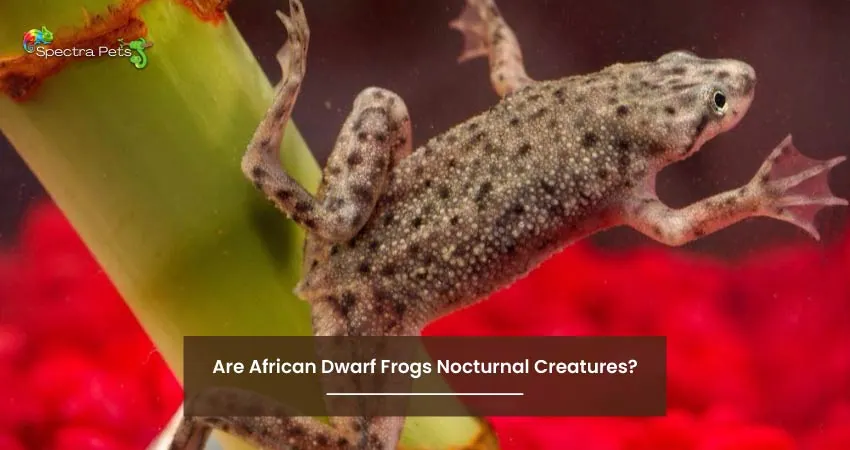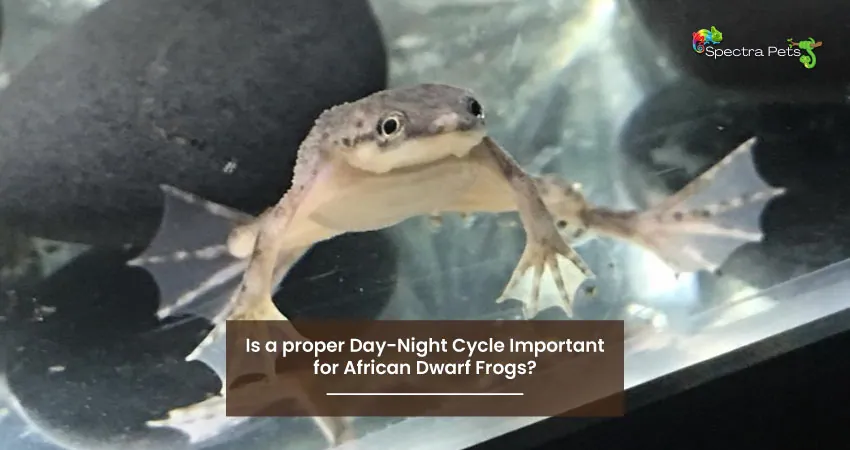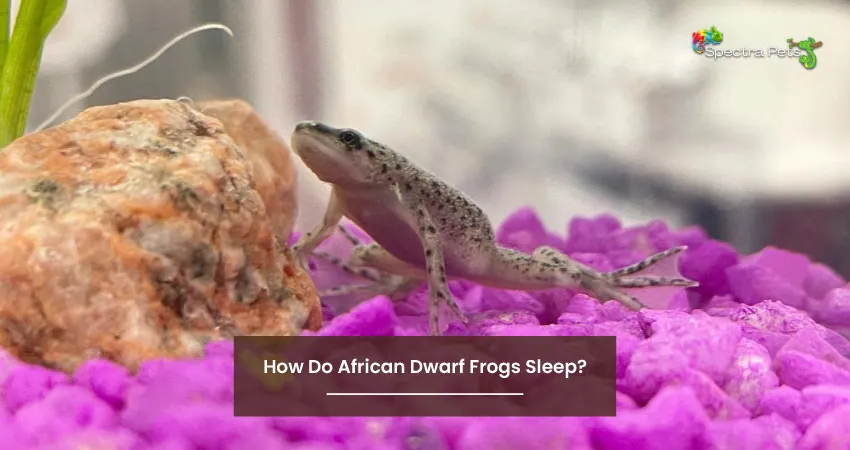As the owner of a beautiful aquarium, you will want to see all your aquatic pet frogs swimming and roaming around. But, you noticed that during the daytime, your pet African dwarf frogs are idling and not being playful.
You might wonder, “Are these frogs exclusively active at night?”
Yes, African dwarf frogs are nocturnal animals. They are most active in the dark of the night. During the nighttime, they constantly swim around, scavenge for food, and perform mating.
This, however, doesn’t mean that they are completely idle during the day. They occasionally swim around and swim up to the surface to breathe in air.

Are African Dwarf Frogs Nocturnal?
Nocturnal behavior is characterized by activity during the night. For African Dwarf Frogs, the answer is clear: they are primarily nocturnal.
During the night, African Dwarf Frogs transform into lively and energetic beings. They swim vigorously, explore their environment, and actively hunt for food. This is a stark contrast to their daytime demeanor, which is generally more subdued and restful.
| Behavior | Daytime | Nighttime |
|---|---|---|
| Swimming | Low | High |
| Feeding | Rare | Common |
| Hiding | Common | Rare |
What Triggers African Dwarf Frogs’ Activity?
The nocturnal nature of African Dwarf Frogs is a complex response to various environmental cues, not a random preference.
Role of Light and Darkness in Their Behavior
African Dwarf Frogs have a heightened sensitivity to light. Darkness provides them with a sense of security, encouraging exploration and feeding. Research conducted by herpetologists indicates that their activity levels increase significantly under low light conditions, aligning with a nocturnal lifestyle.
Sensitivity to Changes in Their Environment
Temperature and water quality are pivotal. These frogs are more active at cooler temperatures, which are common at night. Moreover, they are sensitive to water conditions; a clean, stable environment positively influences their activity patterns.
Tip for pet owners: Maintain water temperature between 68 and 78 degrees Fahrenheit (20-26 degrees Celsius) and regularly check water quality to mimic their natural nocturnal rhythm.
Is a proper Day-Night Cycle Important for African Dwarf Frogs?

A proper day-night cycle is extremely important for your frog’s health and growth. It will allow the frog to feel comfortable engaging in various activities in the dark, and get some rest during the day.
You can easily adjust the cycle by putting the aquarium in a dark corner and introducing some UVB lighting in it. That way, you can simulate the day-night cycle at hours of your own preference. The best advice I can give you is to leave the lights on in 12-hours intervals in order to achieve a proper cycle.
But, do not deprive the frogs completely from natural sunlight. This will significantly reduce the natural growth of your pets.
How Do African Dwarf Frogs Sleep?

Most African dwarf frogs rest and sleep during the daytime, for as long as 12 hours. They will go into their usual hiding spots, place themselves on the aquarium plants, or just stay at the bottom of the tank and rest there. They also need to be assured that they are well fed and that there is no threat from potential predators present in order to get a proper sleep cycle.
Navigating the night requires special adaptations, and African Dwarf Frogs are remarkably equipped for their nocturnal lifestyle.
Use of Vibrations and Sounds
They are adept at sensing vibrations in the water, which helps them locate prey and avoid predators. Their lateral line system, a series of sensory organs, is key to this ability. Additionally, they use a series of chirps and clicks to communicate with each other during the night, a phenomenon studied extensively by bioacousticians.
Interaction with Other Frogs During Nighttime
African Dwarf Frogs are social creatures. At night, they are often observed interacting with each other, engaging in behaviors such as following and gentle nudging. This social interaction is not just casual; it is a complex form of communication that researchers believe is essential for establishing territory and mating.
How Does Nocturnal Behavior Affect Their Feeding Patterns?
Nocturnal behavior in African Dwarf Frogs has a significant impact on their feeding patterns. Their hunting strategy is tailored to the cover of darkness.
At night, African Dwarf Frogs become voracious hunters. Their diet in the wild primarily consists of small insects, larvae, and worms. In captivity, they thrive on a diet of brine shrimp, bloodworms, and specially formulated frog pellets.
| Food Type | Wild Diet | Captive Diet |
|---|---|---|
| Insects | Common | Rare |
| Larvae | Common | Occasional |
| Worms | Common | Occasional |
| Brine Shrimp | Rare | Common |
| Frog Pellets | Absent | Common |
African Dwarf Frogs use their acute sense of touch and hearing to locate prey in the dark. They are ambush predators, often waiting patiently for prey to come within reach before striking quickly and efficiently.
Tip for pet owners: To simulate their natural hunting behavior, consider feeding them in the evening when they are most active and using tongs to mimic moving prey.
How to Care for a Nocturnal African Dwarf Frog in Captivity?
Caring for a nocturnal creature has its unique set of requirements. Here’s how to make your African Dwarf Frog feel at home, respecting its nocturnal nature.
A dimly lit tank with plenty of hiding spots is ideal. Use subdued lighting and consider a light timer to mimic a natural day-night cycle.
Example Tank Setup:
- Lighting: Low, with a timer set to 12 hours on/off
- Hiding Spots: At least 3-4 per frog (plants, caves, etc.)
- Water Temperature: 68-78°F (20-26°C)
Maintaining a stable and appropriate environment is key. Use a heater to keep the water temperature consistent and choose lights that can be dimmed or are specifically designed for nocturnal setups.
Tip for pet owners: Invest in a high-quality aquarium thermometer and check the temperature regularly.
Do All African Dwarf Frogs Exhibit the Same Level of Nocturnality?
While nocturnality is a common trait among African Dwarf Frogs, there is some variability among individuals.
Some frogs may be more active during dusk (crepuscular) rather than deep night. Factors like age, health, and stress can influence this behavior.
Research suggests that younger frogs tend to be more nocturnal than older ones. Stressful conditions, such as poor water quality or illness, can also disrupt their normal activity patterns.
How Does Nocturnal Behavior Contribute to African Dwarf Frogs’ Survival?
Nocturnality is not just a quirk; it’s a survival strategy.
Avoiding predators is a key advantage. Nighttime activity allows these frogs to hunt and explore with a reduced risk of being spotted by predators. It also allows them to avoid the heat of the day in their native African habitats.
Nocturnality likely evolved as a survival mechanism. By being active when predators are less likely to be hunting, African Dwarf Frogs reduce their risk of predation.
Final Words
If you see your African dwarf frog not doing much during the day, don’t get worried. It is a completely natural behavior because of their nocturnal trait, and one that should be maintained properly.
